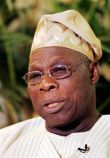Nigerian president pushes Darfur rebels, Sudan govt to sign fresh peace deal
By DANIEL BALINT-KURTI, Associated Press Writer
 ABUJA, Nigeria, Nov 4, 2004 (AP) — Pushing for a peace accord by week’s end, Nigeria’s president called together Sudan government officials and Darfur rebels Thursday to try to resolve differences over creation of a no-fly zone.
ABUJA, Nigeria, Nov 4, 2004 (AP) — Pushing for a peace accord by week’s end, Nigeria’s president called together Sudan government officials and Darfur rebels Thursday to try to resolve differences over creation of a no-fly zone.
African Union mediators and Western diplomats have been trying for two weeks to broker a new accord ending fighting in Sudan’s Darfur region, which has uprooted 1.5 million and killed tens of thousands.
Thursday’s talks with Nigerian President Olusegun Obasanjo — the talks’ host — and rebels and government officials focused on wording of a draft security agreement.
Obasanjo concentrated on wording of a paragraph restricting military flights over Darfur — a major sticking-point, delegates in the negotiations said.
The draft calls for “an effective cease-fire on land and air, in particular: refraining from all hostilities and military actions.”
Rebels argue this does not go far enough, and are demanding the accord clearly impose a no-fly-zone over Darfur.
Abdulrahman Zuma, spokesman for the Sudanese government, rejected that out of hand: “The government of Sudan will never accept that kind of embargo on its flights.”
Sudan’s Arab-dominated government is widely accused of mounting bombing raids in coordination with ground attacks by Arab tribal militia on the villages of non-Arab African farmers.
Ahmed Tugod Lissan, head of the rebel Justice and Equality Movement delegation, said Obasanjo had proposed an alternative wording, saying Sudan would refrain from flying aircraft over Darfur which could threaten the rebel movements or civilians.
“At the end of the meeting between the parties, we had still not agreed,” Lissan said.
Late Thursday, the no-fly zone demand remained in dispute — with Darfur’s two rebel groups saying there were ready to sign the security accord, but saying the government was still unwilling.
Rebels’ demand that any accord specifically mention “Janjaweed” also appeared to be opposed by Sudanese officials.
Sudan’s government is accused of backing ethnic Arab militia, the so-called Janjaweed, in a campaign of violence — including rapes, killings and the burning of villages — to help put down a 20-month rebellion by non-Arab African groups. The government denies backing the militias.
The United Nations has said the situation in Darfur is the world’s worst humanitarian crisis. There are no firm figures on the numbers killed by violence; disease and malnutrition alone among the displaced are believed to have killed more than 70,000.
The talks began in the Nigerian capital, Abuja, two weeks ago, after two earlier rounds collapsed.
The top U.N. envoy to Sudan warned the U.N. Security Council on Thursday that the vast Darfur region could easily descend into anarchy if thousands of extra African Union peacekeepers are not deployed quickly and peace negotiations speeded up.
“Fighting is breaking out in more and more places. Parties are provoking one another. Militias are ganging up,” he said. “If this negative trend is not reversed it is a recipe for disaster.”
